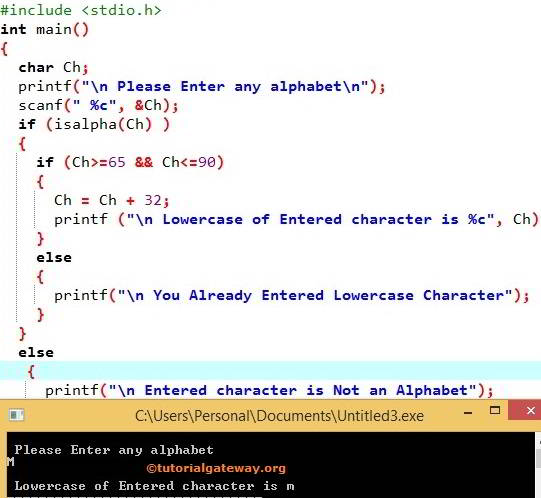

SeeĬhapter 13 for more information on locales. Which case the functions listed above will return the same character you pass in. Used in the current locale some characters don’t have an upper- or lowercase version, in Upper- and lowercase depend on the characters being Theįirst form of each of these is the narrow character version the second form (with theĮxtra “w”) is its wide character equivalent.Įach of these functions converts the case of the character using the current global The simplest way toĭo it is with using one of the four-character conversion functions toupper, towupper, tolower, and towlower. Say “string,” I mean a sequence of characters, either narrow or wide).

Returns: It returns the modified string obtained after converting the characters of the given string str to lowercase. Syntax: char strlwr (char str) Parameter: str: This represents the given string which we want to convert into lowercase. Not surprisingly, there is more than one way to convert a string’s case (and when I The strlwr ( ) function is a built-in function in C and is used to convert a given string into lowercase. String of characters to upper- or lowercase, you have to do it yourself, sort of. C++ Program to Convert Uppercase String to Lowercase String. Whole thing to upper- or lowercase, but, in fact, it doesn’t. If c is uppercase alphabet then we add 32 from c to get its lowercase equivalent character. The loop runs from i 0 suistar7 C++ String to Uppercase and Lowercase. One would think that the standard string class has a member function that converts the Then, we converted all the characters of str to lowercase using a for loop. As noted in the link, lowercase '' is either '' and '' depending on the position in the word, and lowercase 'SS' in German is either '' or 'ss' - depending on the word ('MASSE' can either be 'Mae' or 'masse' depending on which homograph it is). This produces the following output: s = SHAZAM 1 In fact, case transformations are a nightmare.

*p = towupper(*p) // towupper is for wchar_t For (basic_string::iterator p = s.begin()


 0 kommentar(er)
0 kommentar(er)
